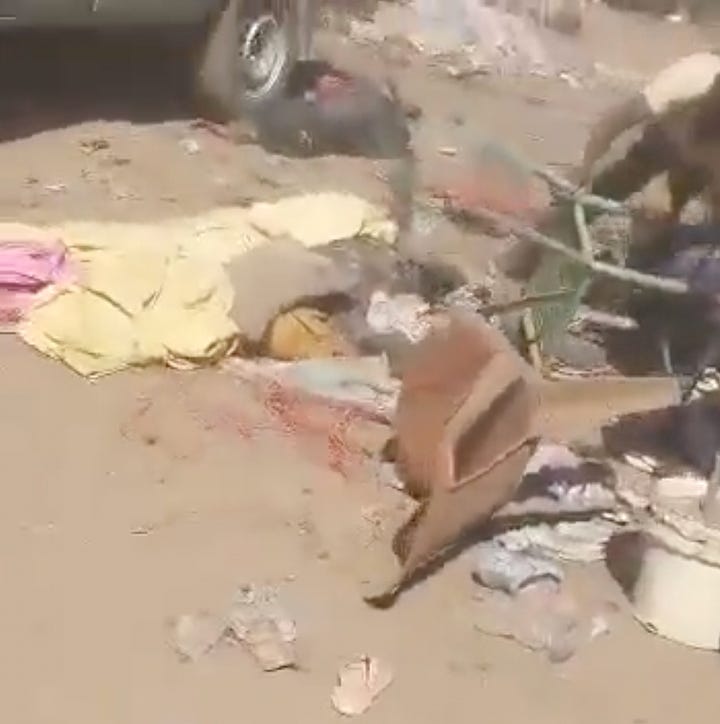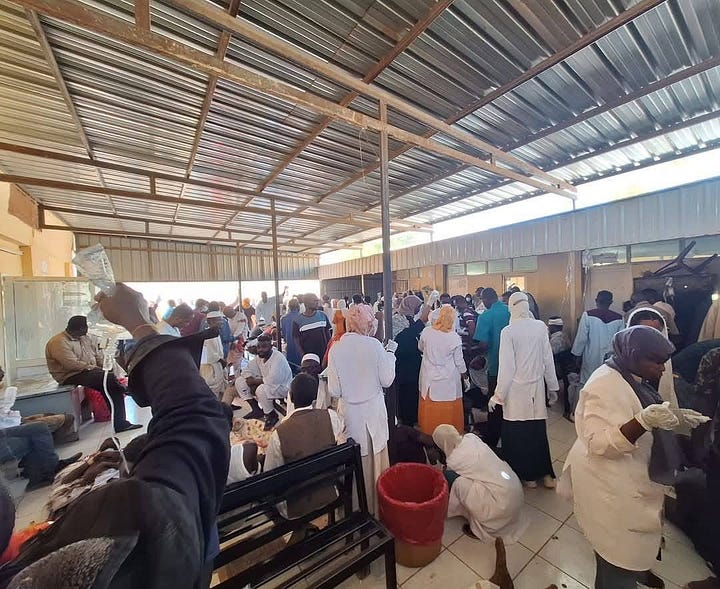Carnage at Omdurman market
54 dead, 150+ wounded, plus dozens of casualties in Darfur bombings




Civilians suffered heavily in a series of attacks in Sudan, culminating in an explosion Saturday at a market in Omdurman, which killed 54 people. The attack was widely blamed on artillery fired by the Rapid Support Forces (RSF).
Dozens more were killed and wounded in airstrikes by the Sudanese Armed Forces (SAF) in several towns of Sudan’s western Darfur region.
Wounded civilians, young and old, flooded the Al-Nau Hospital in Omdurman after explosions at the Sabreen Market in northeastern Omdurman, an area controlled by the Sudanese Armed Forces, but within shelling distance of RSF positions.
The Secretary General of Doctors Without Borders (MSF) Chris Lockyear was visiting the hospital, which MSF supports, as patients started to arrive. He said,
“I can see the lives of men, women and children torn apart with injured people lying in every possible space in the emergency room as medics do what they can. There are dozens and dozens of people with devastating injuries, the morgue is full of dead bodies. What I see in front of me is a scene of utter carnage, yet another tragic example of this relentless war on people.”
The Khartoum State Ministry of Health said that 54 people died and 158 were injured.
Gruesome video from Sabreen Market, which circulated on social media, showed dead and wounded victims, scattered vegetables and foodstuffs, and toppled chairs at the open air market, where vendors had set up stalls to sell their wares.
MSF condemned the attack, as did various human rights groups.
The deadly attack happened a week after the RSF had killed another 70 people or more at the Saudi Maternity Hospital in El Fasher, North Darfur, which prompted widespread diplomatic outrage in Sudan, the Middle East, and beyond.


In a statement, the Rapid Support Forces denied responsibility for the attack on Sabreen Market in Omdurman. They said that they do not target populated areas of Omdurman and said all artillery shells in the Thawrat neighborhoods of the city were launched from military platforms of the army and its militias.
Bombing of gold mine in North Darfur
Meanwhile, 13 civilians were killed and dozens of others were injured when the Sudanese Air Force raided Al-Hamra Al-Bir mine, located east of Kutum city, on Wednesday, January 29, 2025. The raid targeted a mine that works for gold prospecting, and the injured were transferred to Kutum Teaching Hospital for treatment, according to sources from the area.
Airstrikes on Manawashi, South Darfur
The Air Force also bombed the Manawashi area of Mershing locality, South Darfur State, on Thursday, January 30, 2025. Local sources said the airstrikes targeted the eastern Al-Masjid and Hilla Jaded neighborhoods, killing three men and three women.
Barrel bombs in Al-Koma, North Darfur
Military aircraft renewed their bombing of Al-Koma, a town in North Darfur that has suffered dozens of bombings since the start of the war. The town was hit with barrel bombs several times January 26-29, according to local sources cited by Sudanese media. The number of deaths, if any, is unknown.
Shelling of Abu Shouk Camp continues
The RSF have continued shelling Abou Shouk, a displacement camp on the northern outskirts of El Fasher. The camp predates the war and is inhabited by people who were victims of the RSF’s previous war of counter-insurgency and extermination during the early 2000s, which was a precursor to the current war.
The shelling is part of a broader military effort to capture El Fasher from the Sudanese army and the allied Joint Force, but the specific military purpose of shelling this camp, if any, is unclear. The latest artillery attacks on Wednesday, January 29, killed 11 people and wounded another 11, according to the Abu Shouk Camp Emergency Room.
RSF artillery targets El Obeid
Rockets fired by the RSF hit the city of El Obeid, capital of North Kordofan, early on February 1, sparking fires in the Petrol Neighborhood, where these trucks were parked. There were unconfirmed reports of deaths and injuries.
Leading up to this, citizens had reported suspected RSF drones over the city’s skies, sparking widespread fear and panic.
News in Brief
The RSF commander-in-chief Mohamed Hamdan Dagalo delivered a video address attempting to revive the morale of his troops, after battlefield losses.
The Sudanese military carried out summary executions in the Jaili oil refinery area and Khartoum North after recapturing large parts of the city last week. The UN Human Rights Office in Geneva says it has verified that at least 18 people, including one woman, were killed in seven separate incidents. Many of the victims were originally from the Darfur or Kordofan regions of Sudan. Soldiers bragged on camera of killing others, suggesting the full toll is even higher.
“These reports of summary executions, following similar incidents earlier this month in Al Jazirah State, are deeply disturbing. Such killings must not become normalized. Deliberately taking the life of a civilian or anyone not or no longer directly taking part in hostilities is a war crime,” said Volker Türk, UN High Commissioner for Human Rights
The Sudanese military continues to advance northward in Al-Jazira State, where the RSF still control some northern towns and villages but are essentially fighting a rearguard action as they retreat back toward Khartoum State. SAF on Saturday captured Hassahissa, a small city on the west bank of the Blue Nile about 50 km north of the state capital Wad Madani. They also advanced along the east bank, reaching within about 40 km of the Khartoum State border.
Background on Sudan’s civil war
Sudan’s civil war erupted in April 2023 and has caused the world’s largest humanitarian crisis. The fighting involves the Sudanese Armed Forces (SAF) and the paramilitary Rapid Support Forces (RSF), two components of the regime of Omar al-Bashir, a long-time dictator toppled by protests in 2019.
Although Bashir is now out of the picture, his forces are fighting for power and survival, pitting the SAF—which draws support mostly from the center and north of the country—against the RSF, which draws support mostly from the west.
Neutral and allied groups are also part of the mix, such as former Darfur rebel groups like SLM and JEM, and the SPLM-North, which controls the Nuba Mountains in the south. Sudan’s war has caused a huge economic collapse, cutting off trade routes, disrupting harvests, closing schools and governments offices, and destroying factories. Oil production has ground to a halt, and neighboring South Sudan is plunged into an economic recession, due to the cutoff of oil shipments via Port Sudan.
Millions of people have fled their homes and are now living in refugee camps, schools, or other makeshift arrangements, often in overcrowded conditions, throughout Sudan.
As the war continues, both sides regularly perpetrate heinous human rights abuses against prisoners of war and civilians, who are often unjustly accused of being collaborators or supporters of the other side.
Sudan War Monitor is a collective of OSINT analysts and journalists committed to tracking the events of the war and the search for solutions. For a year and a half, we have covered the various peace initiatives to date, mass atrocities, major battles and changes of territorial control, and major humanitarian developments.

